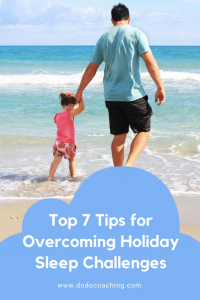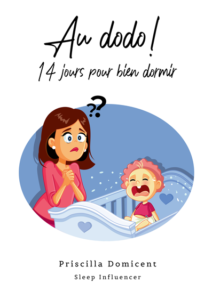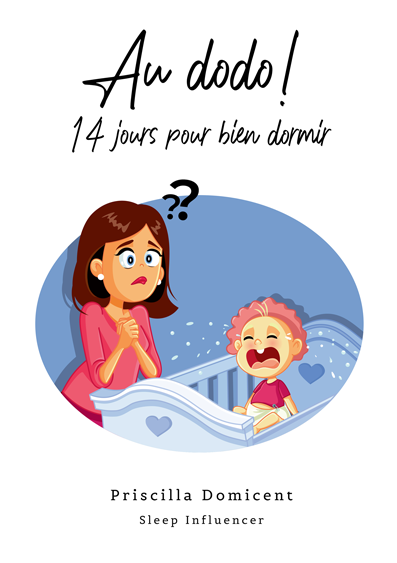Summer has arrived and this is the period when we generally reunite with friends and family. Vacations are the perfect time to spend quality time with the kids. Summer holidays are so precious; we do look forward to them during a significant portion of the year.
However, this season also rimes with stressful situations and sleep disruptions. Many parents express great concern about their child’s sleep, specifically when traveling and during family visit. They worry that all the achievements related to their little one’s sleep habits are in danger if they change time zones or sleep environment. Sleeping in an unknown place or in an unfamiliar bed can simply disturb a kid’s nights.
As a Certified Sleep Coach, I would like to share my tips to alleviate some stress regarding your child’s sleep this time of the year.

Discuss and practice beforehand
Unsurprisingly, stays away from home cause a lot of disruptions to the everyday routines. To better prepare your little one, you can tell him what he could expect from the environment where he will spend his holidays. You could describe the activities you will be doing together and his assigned sleeping area as best as you can.
If you bring your own portable crib, let him sleep in it with his favorite lovey or stuffed animals for a couple nights prior to your departure.
Plan your journey around sleep time
If you are lucky, your baby may have (had) the great ability of sleeping when traveling in a car, on a train or on a plane. However, this habit changes over time as he grows. Therefore, you need to be flexible and prepared. Children are naturally curious and excited when traveling. It’s often hard for them to sleep en route, especially during the daytime.
First of all, make sure to start your journey with a well-rested child. During the days and nights preceding your departure, help him to get enough qualitative sleep.
Then, plan your departure and arrival times around naps as much as possible, or during nighttime. If traveling by car, consider driving overnight or during the kid’s usual nap time to maintain his sleep routine. When going on holidays by plane, select the very early flight and hope that your child will go back to sleep once boarded (or even before). You can also choose for an overnight flight, if you have the option.
Motion sleep (i.e. sleeping in a car, a stroller or a swing) keeps your child’s brain in a light sleep. As a consequence, he does not get to enjoy a deep and restorative sleep that is so important to his development. Think about how you feel when you dose off in a car. You often have the impression to be more exhausted than before falling in the arms of Morpheus. This is because you did not manage to go through full sleep cycles, and thus enter into deeper sleep. Therefore, it is recommended to put your kid down earlier than his usual bedtime or let him enjoy a restorative nap once you have arrived at your destination.
Follow a consistent schedule but stay flexible
Holidays disrupt your kid’s daily routine life. It might be difficult to keep up with his regular schedule. There can be tours and additional outings that are thrilling for everyone. However, they might have some adverse consequences for your child.
In the midst of these disorders, remember that your child should sleep and eat (as often as possible) according to a consistent schedule. An occasional nap during the trip or a later-than-usual sleep time should not do too much harm. But if his naps are inconsistent or he goes to bed far later than usually for several days in a row, he can become overtired, cranky, more agitated and difficult to console.
Keep up your kid’s standard schedule as best as possible, no matter where you travel to. This involves you to plan activities ahead of time and keep the meals, naps and sleep time the same each day, with the least hindrance possible.
Make quiet time part of your daily routine
It can be tough to withstand the desire to participate in all events of the summer season. Several activities jam-packed into a day can be tough on the little one and affect its sleep.
Kids are sensitive by nature. They pick up on all the enjoyment and stress during the holidays and can get overtired after busy days. This can possibly lead to more night awakenings and shorter naps. Therefore, you need to plan for some daily quiet time in a peaceful space. This will help to lengthen and improve his sleep, during both day and night time.
Keep things as familiar as possible
Children are reassured when they recognize familiar objects. Think about packing your kid’s favorite stuffed animals, books, pacifiers, or beloved blanket and crib sheets. Thanks to their texture and smell, he will have the impression of “being at home”. It is not necessary to bring along the entire collection of his belongings, just pick some of his favorite objects.
Should your little one not sleep in a separate room, make sure he can not see you sleeping nearby. Also, think about how to position his crib so that you can turn on the light without having it shine in his eyes. Sometimes putting a piece of furniture between the crib and the parent’s bed is enough to cut off visual stimuli. If your child suddenly realizes the proximity of his parents, it could force frequent awakenings and cry for the pleasure of sharing even more time with them.
Whether you stay in a hotel or in a place lots of people who will be running around, it may be hard for your child to fall asleep. It can be very distracting to hear what is going on outside the door and he may want to join in on the fun. Have a fan running or a white noise machine that will cover the disturbing noises. This will help focus on sleep.
If your kid feels comfortable and the routines are consistent and predictable, it will help him feel secure and protected enough to fall asleep in that new place. That is why it is also important to recreate your bedtime routine when away from home. If bath, books or songs are soothing techniques in the standard routine, don’t skip them. It is usually not a question of who intervenes during the bedtime routine but rather how consistent you are. So, fell free to let somebody else take over in the evening. You also deserve a break during the holidays!
Give your child time to adapt to the new environment
Your kid could be the best little sleeper at home. But, things might get different once settled in an unknown environment. It’s normal for babies and toddlers to test boundaries around sleep when they are somewhere new.
Once you arrived at your holiday destination, your child may cry at bedtime or wake up at unusual times. The most effective way to deal with this kind of behavior is to respond the same way you would do at home. Hang on tight to your steadiness and remain consistent. If you do so, your kid will adapt to the new environment and will be sleeping as if he was home within the second or third night.
Should you stay at a friend’s or relative’s house, warn them beforehand that there could be some meltdown episodes during the day and at night. These will be caused by necessary adjustments to new sleep arrangements. Stay clear with you approach to make sure everybody will be on the same page.
Use positive sleep associations once back
During your holiday stay, your little angel might have backslid a little bit. To reassure him, you have maybe relied on sleep-facilitating techniques that involved your intervention like rocking, snuggling, singing, nursing or patting his back.
When you get home, go back to your normal routine. Re-establish good sleep habits as quickly as possible. Help your child to rely on positive sleep associations helping him go to sleep, stay asleep, and wake up happy. Think about giving him his best stuffed buddies to spend naps and nights together. White noise, pacifiers and lovies are also great alternatives.
You may want to consider keeping the activities very light for the first days in order to get back on track with the routines, sleep and schedule. After a couple days (and possibly a few tears), the whole family should sleep very well again, each in its own bed.
The better your child sleeps at home, the better the odds are that he will sleep well again once back from vacation. Conversely, if he hasn’t slept through the night on a regularly basis, there will be nothing new under the sun. Chances are that he will continue to struggle falling asleep alone during and after your summer break.
Traveling can be very anxiety-provoking for you and your kid. However, it is generally a worthwhile experience for the whole family. Summer adventures have the tendency of strengthening the family bonds and to giving all family members the chance to go outside his comfort zone.
Don’t be anxious about keeping your kid sleeping schedule. Remain consistent, break some rules and, more importantly, have fun!
If you would like to get more information on how to improve the quality and / or the quantity of your child’s sleep (and yours at the same time), do not hesitate to schedule a 15-minute preliminary consultation. It is a totally FREE & NON-BINDING offer!









